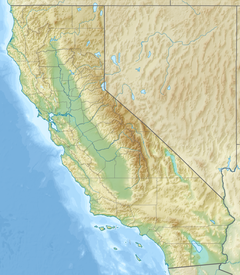Point Vicente Lighthouse

Point Vicente Light
|
|
|
California
|
|
| Location | Point Vincente Rancho Palos Verdes California United States |
|---|---|
| Coordinates | 33°44′31″N 118°24′39″W / 33.741867°N 118.410738°WCoordinates: 33°44′31″N 118°24′39″W / 33.741867°N 118.410738°W |
| Year first constructed | 1926 |
| Automated | 1973 |
| Foundation | concrete basement |
| Construction | reinforced concrete tower |
| Tower shape | cylindrical tower with balcony and lantern |
| Markings / pattern | white tower, black lantern |
| Height | 67 feet (20 m) |
| Focal height | 155 feet (47 m) |
| Original lens | Third order Fresnel lens by Barbier, Bernard and Turenne |
| Current lens | Third order Fresnel lens |
| Range | 24 nautical miles (44 km; 28 mi) |
| Characteristic | Fl (2) W 20s. |
| Admiralty number | G3886 |
| USCG number | 6-0170 |
| Managing agent | United States Coast Guard |
Point Vicente Lighthouse is a lighthouse in California, United States, in Rancho Palos Verdes, north of Los Angeles Harbor, California. It is between Point Loma Lighthouse to the south and Point Conception Lighthouse to the north. The lighthouse is listed on the National Register of Historic Places.
Point Vicente Lighthouse was built in 1926 on the Palos Verdes Peninsula. The light source was dimmed during World War II to avoid aiding the enemy. It was automated in 1971 by the United States Coast Guard. The original third order Fresnel lens still revolves in the lantern room. In 2015, the Coast Guard announced its intention to install an LED light with a 14 nm range, replacing the current light and lens.
The Point Vicente Lighthouse is just north of the entrances to the Los Angeles/Long Beach Harbors. It was operated and maintained by the United States Lighthouse Service prior to that Service being merged with the U.S. Coast Guard, which was delegated all aid-to-navigation responsibilities in 1939. The lighthouse was manned until 1971 when it was automated by a remote electronic aids-to-navigation monitoring system.
The white cylindrical tower is 67 feet (20 m) tall, and the masonry structure is built on the edge of a 130-foot (40 m) cliff. This places the center of the lantern 185 feet (56 m) above the ocean, and because of this elevation, the 1.1 million candlepower-beam has a nominal (clear weather) visible range of 24 nautical miles (44 km; 28 mi). The Coast Guard Light List specifies its light characteristic as being a pair of two white flashes, repeating that pair every 20 seconds. An emergency light of reduced intensity operates if the main light is extinguished. The most striking feature in the lighthouse is the classical third-order rotating Fresnel Lens located in the lantern. This particular lens was manufactured around 1910 in Paris, France, by Barbier, Bernard and Turenne, the oldest lens making company in the world. This lens is made up of hand-ground prisms held in place by a cast brass frame. The prisms and frame represent an excellent example of the precision achieved by optical scientists and the lens making art in utilizing the known principles and properties of light.
...
Wikipedia

